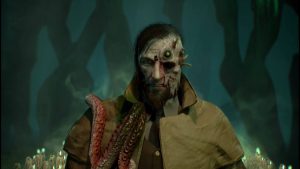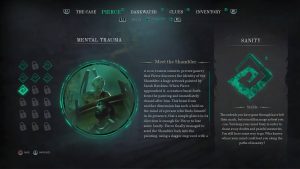Call of Cthulhu: The Official Game once again tries to bring gamers into the lovecraftian world of elder gods, deep mysteries, and of course: going insane. The game tries to bridge the gap between action and adventure style gameplay, but the game just doesn’t do anything with the pieces it tries to develop.
Taking the Case:
The game takes place after World War 1 with Edward Pierce: A former solider turned P.I. suffering from nightmares. He gets a case to explore the mysterious death of family on a small island called Darkwater. With strange forces at work, it’s up to him to keep alive and sane to solve the case.
The first thing you do is assign character points to Edward in several categories. Each one will allow you to uncover more clues or unlock different dialogue options while talking to people. Once you’re at the island, the game follows a linear format of going through each set piece as you uncover more of the story.
The environmental design is really well done; as Edward, you’ll explore a former mansion, mysterious caves, and fitting a Lovecraft game: A mental hospital. Unfortunately for all the atmosphere the game builds up, none of it found its way to the gameplay.
Wandering in the Dark:
Call of Cthulhu does its best to make the player feel like they’re participating in the story, except for the fact that they’re not. The vast majority of the experience is wandering around looking for points of interest to interact with. If you were hoping that conversations and player choice would impact the story, you are going to be disappointed.
Because of the lack of actual playable sections, the story itself remains fixed regardless of what choices you take. Speaking of the story, there were many times where the cutscenes didn’t make sense in relation to the story beforehand. Without spoiling it too much, two of the after credit stingers based on what ending you chose didn’t work with the previous cutscene’s ending.
Even though you do get more character points for upgrades, once again, they do not translate into different or diverging paths. The game even tries to pull the “they will remember it” trick from Telltale at some “big choices,” but again, none of it pans out.
With all that said, there were a few spots where there was actual gameplay, and they somehow made the game worse for the most part.
Going Mad:
Throughout the six hours it took me to beat the game, there were about five or six sections of gameplay. These gameplay areas feel like they were ripped from another game. Stealth makes up the majority of the gameplay; with one very odd gun section near the end where you don’t aim with your gun. Despite showing the main character having a gun on him, he will be more than happy to sneak around and be unable to defend himself otherwise.
There are two “boss fights” in the game where you have to deal with a monster, but your actions are too limited to make them interesting.
The best section in the game, and what I was hoping for more from, happened in the middle. The player is tasked with breaking out of the mental hospital with the overall goal of causing a distraction to get the guards away from the exit.
There were several ways of doing it, with shortcuts and additional things to do based on what stats I chose. If the gameplay had more of these types of sections, even without it affecting the story, the game would have been so much better.
I’m Not Mad, I’m Disappointed:
After finishing the game and spoiling myself on the other endings, I realized that so much of the game is just fluff. As we’ve talked about before: Choices must have actual consequences for them to matter in video games. The game seems to have been built to hide the fact of just how little there is to Call of Cthulhu.
This is one of those titles where it’s more enjoyable to watch someone play it and take in the story than it is to play it yourself. I know that part of the Lovecraft charm is that feeling of hopelessness and not being able to change your fate, but I don’t need to spend $45 to learn that.




